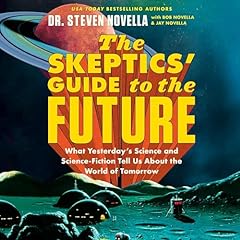
How to Talk to a Science Denier
Conversations with Flat Earthers, Climate Deniers, and Others Who Defy Reason
No se pudo agregar al carrito
Add to Cart failed.
Error al Agregar a Lista de Deseos.
Error al eliminar de la lista de deseos.
Error al añadir a tu biblioteca
Error al seguir el podcast
Error al dejar de seguir el podcast
 Exclusivo para miembros Prime: ¿Nuevo en Audible? Obtén 2 audiolibros gratis con tu prueba.
Exclusivo para miembros Prime: ¿Nuevo en Audible? Obtén 2 audiolibros gratis con tu prueba.Compra ahora por $19.10
-
Narrado por:
-
Eric Michael Summerer
-
De:
-
Lee McIntyre
"Climate change is a hoax - and so is coronavirus." "Vaccines are bad for you." These days, many of our fellow citizens reject scientific expertise and prefer ideology to facts. They are not merely uninformed - they are misinformed. They cite cherry-picked evidence, rely on fake experts, and believe conspiracy theories. How can we get them to change their minds and accept the facts when they don't believe in facts? In this book, Lee McIntyre shows that anyone can fight back against science deniers, and argues that it's important to do so. Science denial can kill.
Drawing on his own experience - including a visit to a Flat Earth convention - as well as academic research, McIntyre outlines the common themes of science denialism, present in misinformation campaigns ranging from tobacco companies' denial in the 1950s that smoking causes lung cancer to today's anti-vaxxers. He describes attempts to use his persuasive powers as a philosopher to convert Flat Earthers; surprising discussions with coal miners; and conversations with a scientist friend about genetically modified organisms in food. McIntyre offers tools and techniques for communicating the truth and values of science, emphasizing that the most important way to reach science deniers is to talk to them calmly and respectfully - to put ourselves out there, and meet them face to face.
©2021 The Massachusetts Institute of Technology (P)2021 TantorLos oyentes también disfrutaron:




















Las personas que vieron esto también vieron:







A little background on me will put the rest of my comments in context. I hold a graduate degree in a hard science as well as an MBA. I have worked in multiple industries including environmental engineering, healthcare, technology, and finance - both on the technical and business sides. Politically I am a moderate.
This book would have been more useful and effective in its message if the concepts of logic, the scientific method, and evidence-based decision making had been applied in a more structured manner and the rhetoric around politics toned down significantly. (I say this even though I personally agree with just about all of the political comments he makes.) There are places where the political messages drown out the messages about how to talk to a science denier, which is what the book title says it is supposed to be about. There are also places where the author's strong political feelings caused him to make some of the very same logical mistakes that science deniers make - which, in a strange way, supports his arguments about how self identity and emotions sometimes make it challenging to base our beliefs on facts. In spite of these flaws, I'm glad I listened to this book and recommend it.
Well worth a listen, good info and some flaws
Se ha producido un error. Vuelve a intentarlo dentro de unos minutos.
Helpful Info
Se ha producido un error. Vuelve a intentarlo dentro de unos minutos.
Important Read
Se ha producido un error. Vuelve a intentarlo dentro de unos minutos.
To help deniers with empathy
Se ha producido un error. Vuelve a intentarlo dentro de unos minutos.
Almost persuaded, but…
Se ha producido un error. Vuelve a intentarlo dentro de unos minutos.


